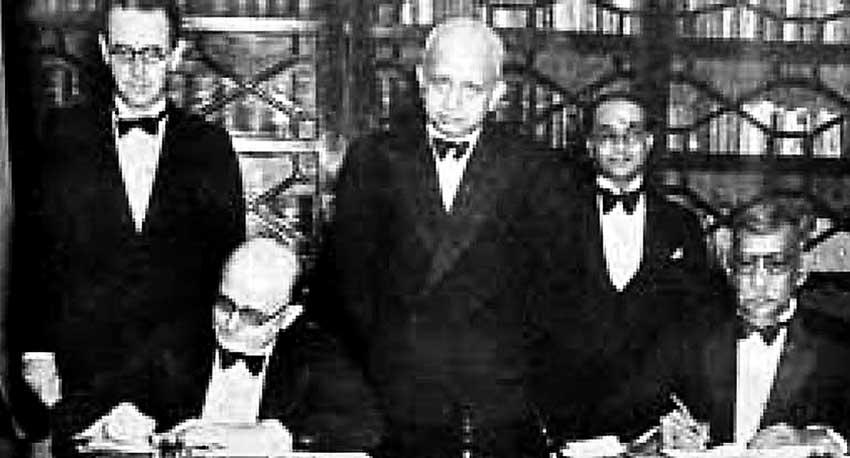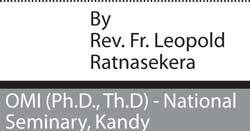Reply To:
Name - Reply Comment

First Premier D.S. Senanayake signing the Independence document in 1948
Seventy years of national politics has seen racial and religious issues rearing their heads in extremist and exclusive gales
Sinhala Buddhist concept must in no way stand a stumbling block to the common national identity of “Sri Lankan-ness”
 Religion, politics and democracy might appear as three distinct realities; in fact, in many ways, both of a religious and secular nature. But strange as it may seem, they emerge strikingly intertwined in an exceptional way ever since independence. This triumvirate has indeed become a permanent national phenomenon in the arena of politics. As a cultural mélange, it betrays both positive and negative impacts with favourable and not-so-favourable intrusions into our national ethos, making considerable in-roads into the democratic options the Sri Lankan people regularly make at the time of elections. The emergence of the Mahajana Eksath Peramuna(MEP) with its radically marxist bent and concurrent launching of the Sri Lanka Freedom Party (SLFP) led by Oxford stalwart S.W.R.D. Bandaranaike, the humiliating defeat of the UNP that followed with the masses buttressed by the pancha-mahā balavēgaya campaign that enlisted the Buddhist Sangha, the tottering civic era of the Dudley and Sirimavo Governments, the economic downturn of the decade of 1970s, the thirty-year-long war, the rise of liberal capitalism under J.R. Jayawardene opening the country to the free-market economy with free-trade zones, the introduction of the demonic executive presidency and chaotic periods of several unsteady coalition governments that followed suit, the accompanying scandals in politics with rampant bribery and corruption, rape of the judiciary, financial mismanagement and present day politico-religious and ethnic extremism that keep poisoning the nation, are some of these tragic events that have rocked the country not without affecting national political currents as well.
Religion, politics and democracy might appear as three distinct realities; in fact, in many ways, both of a religious and secular nature. But strange as it may seem, they emerge strikingly intertwined in an exceptional way ever since independence. This triumvirate has indeed become a permanent national phenomenon in the arena of politics. As a cultural mélange, it betrays both positive and negative impacts with favourable and not-so-favourable intrusions into our national ethos, making considerable in-roads into the democratic options the Sri Lankan people regularly make at the time of elections. The emergence of the Mahajana Eksath Peramuna(MEP) with its radically marxist bent and concurrent launching of the Sri Lanka Freedom Party (SLFP) led by Oxford stalwart S.W.R.D. Bandaranaike, the humiliating defeat of the UNP that followed with the masses buttressed by the pancha-mahā balavēgaya campaign that enlisted the Buddhist Sangha, the tottering civic era of the Dudley and Sirimavo Governments, the economic downturn of the decade of 1970s, the thirty-year-long war, the rise of liberal capitalism under J.R. Jayawardene opening the country to the free-market economy with free-trade zones, the introduction of the demonic executive presidency and chaotic periods of several unsteady coalition governments that followed suit, the accompanying scandals in politics with rampant bribery and corruption, rape of the judiciary, financial mismanagement and present day politico-religious and ethnic extremism that keep poisoning the nation, are some of these tragic events that have rocked the country not without affecting national political currents as well.
Politics vis-à-vis religion
The part played by ethnicity and religion ended up in a disastrous thirty-year-long miserable war that left the entire country and its people in dire straits with its accompanying bȇte-noire of war crime accusations hurled at the country by UNHRC. In general, all elections – whether local government, parliamentary or presidential – appear to have been fought on ethno-religious grounds, which alienated the minorities from the majority ethno-religious community, thus fragmentising the larger society. The unitary nature of the country has been put at serious risk and alienation of people from one another had gradually become a festering wound that ever got worse showing no sign of any definitive healing in sight and bereft of any guarantee of reconciliation: instead re-enforcing alienation.
There is a considerable number of independent critics who are prone to think that those in government should not directly deal with matters pertaining to religion and religious groups in the country. They entertain the creation of a secular State where matters of a religious nature are left entirely in the hands of religious authorities with the State not meddling with any particular religious issue. While the issue of the right to freedom of conscience and the personal and public right to express one’s religious beliefs are honoured as a matter of fundamental human rights, reference to religion need not be shrined officially in the Constitution: least of all declaring a specific religion as given prominence of place constitutionally. In imitation of the tradition of western democracies which by majority are secular in character, these States while retaining autonomy in socio-political, economic, legal and cultural matters, leave the religious field entirely to its own autonomy without any undue interference. They may not even interfere officially as government policy assists churches, temples, viharas, religious institutions and establishments, projects and the like, as well as caters to the needs of the clergy.
Sri Lanka has engendered a diametrically different scenario in this regard. Religions are mentioned in the Constitution with Buddhism, the religion of the majority, being given pride of place and accorded an eminent position. It is however evenly balanced by the pledge to safeguard the freedom of worship and propagation rights accorded to other religions in the country such as Hinduism, Christianity and Islam. There is a constant tendency to cast those in State portfolios in the image of devout and fervent religious observers who seek blessings from religious dignitaries when assuming office and who are often seen participating in important religious functions and ceremonies enacted in temples, churches and shrines. Religious establishments, celebrations and special events are given State sponsorship and there are government departments dealing with religious matters and needs that prop up. Religions are even assisted financially with regular allocation of funds for specific programmes and projects. Unfortunately, it is to be regretted that there is brazen abuse of religion during the time of elections, which picks it up as an ideological tool to fight elections and woo people of various religious persuasions.
Anomalies and contradictions
Among the seventy registered political parties, there are over fifteen with their identity and policies rooted in some religious/communal ideology such as the two major parties of UNP, SLFP/SLPP, TNA, JHU, TULF and SLMC. There is a religious majority nationwide comprising Sinhala-speaking Buddhists who constitute always a major component of victory and religious minorities whose support is always solicited. Sri Lanka that has rightly and honourably preserved her privileged position as the seat of Theravāda Buddhism staunchly wishes itself to remain a Sinhala Buddhist country which makes of the local democratic way of life, in real terms, an implicit “theocracy.” It is no more to be considered a simple secular State but a religious one. It is quite risky to allow politics of an ethno-religious nature and to have a plethora of political parties based on race, language and religion inundating a country. Sri Lanka may be historically a Sinhala Buddhist country, but politics and civil matters should not be conditioned by these factors. Seventy years of national politics has seen racial and religious issues rearing their heads in extremist and exclusive gales, which has proved disastrous to the onward march of this country. It has even led this little island-nation to an internecine and fratricidal thirty-year-long civil war that spilled into an international dilemma. We are thus on a destructive and pernicious path with festering extremism. The best course for a national life of economic prosperity, political stability and religious harmony to be achieved is to prudently avert forms of extremism and see to the fulfillment of fundamental human rights of all citizens irrespective of their ethnic, cultural, religious, racial, language differences and even political ideologies whilst working genuinely towards building up a common Sri Lankan identity of which all can be proud.
Conclusion
Religion should not be politicised and certainly is not to be used as a major issue on which to fight any kind of election. Whatever the political ideology parties may espouse, be it liberal capitalism or stringent socialism, religion must be kept away from campaigns while ensuring in any political system, the respect and honour religion, belief and freedom of conscience deserve, as a universal and fundamental human right. Politics is for the service of a country’s common good and is duty-bound to avoid making religion a divisive or controversial issue that disrupts social harmony and jeopardise solidarity. The Sinhala Buddhist concept must in no way stand a stumbling block to the common national identity of “Sri Lankan-ness”. Whether in the Sinhala Buddhist majority or in any other language-religious minority, all are noble citizens of the same motherland and have Sri Lanka as their common home. The plethora of its diverse cultures and religious traditions should serve only as an enrichment of our history, ethos and civilization. This is true patriotism in question. Religions can only make people better with their spiritual, moral and ethical teachings which indeed have implications even for politics, economics and international relations. Religions must rule the conscience of both rulers and the civil population and must never be subservient to any other influence. It is best to liberate the national political culture from its present ties to religion, thus allowing the perennial and hallowed teachings of our great religious traditions to remain unsullied by political bigotry, leaving them free to guide us all to higher ideals beyond the mere temporal, mundane, impermanent and secular involvements.